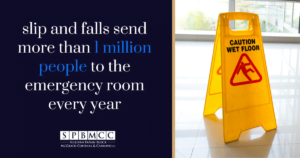Can I Sue for a Slip and Fall Accident?
February 9, 2022 in Negligence, Personal Injury
For many Americans, winter is synonymous with months of snow and ice. While these weather conditions can be picturesque and enjoyable for many, they can also create dangerous conditions. Chances are, you or someone you know has suffered a painful fall on snow or ice during the winter. While many falls lead to only minor bruising, others can lead to serious injuries.
If you have suffered a slip and fall accident due to someone else’s potential negligence and are wondering if you have the right to file a lawsuit, the personal injury attorneys at SPBMCC have provided a guide below to help you decide whether or not you have a case.

What Is a Slip and Fall Accident?
A slip and fall accident occurs when a person falls and is injured on someone’s property due to a hazardous or unsafe condition. These accidents can happen anywhere, including at a business, store, public street, sidewalk, or personal residence. If you were to suffer a slip and fall accident on public or private property, and the owner or manager had failed to take appropriate precautions or steps to fix the problem that led to the accident, the owner could be held liable for your injuries.
During the winter months, slip and fall accidents are typically a consequence of snow and ice. If a considerable amount of ice or snow accumulated outside a building, and the building owner fails to properly tend to it, the owner may be held liable for accidents that occur as a result of the ice or snow. The following examples are just a few common locations where winter slip and fall accidents might occur:
- Stairs
- Sidewalks
- Parking lots
- Commercial or residential properties
- Parks and playgrounds
- Walkways
What Injuries Commonly Occur in Slip and Fall Accidents?
In these types of cases, there are several types of injuries you could suffer, ranging from mild to severe:
Fractures
A fracture is a partial or complete bone break. Common signs or symptoms include swelling, bruising, pain around the afflicted bone, or the inability to move the area.
Sprains and Strains
Sprains are the tearing or stretching of a part of a ligament, while strains are an injury to a muscle or band of tissue that attaches a muscle to the bone. Those experiencing sprains and strains typically notice swelling, pain, bruising, and limited mobility in the injured area.
Concussions
These brain injuries, caused by a bump, blow, or jolt to the head, are one of the most serious slip and fall injuries, and should be taken seriously. Concussed individuals might experience a headache or pressure in the head, nausea or vomiting, dizziness, blurry vision, light or noise sensitivity, or memory loss.
If you have experienced any of these injuries as a result of a slip and fall on another person’s property, you might be able to pursue legal action.
Do I Have a Slip and Fall Claim?
While you may have fallen on someone else’s property, not all slip and fall accidents warrant legal action. In order to file a lawsuit, there must be evidence of neglect by the property owner or manager. To have a winning claim, you and your legal team will need to prove that the owner of the property is responsible for the accident. To do so, you must be able to answer the question, “If the property owner was more careful, could this accident have been prevented?” You could also have a valid claim if the property owner neglected their duty to maintain reasonably safe conditions.
To win your slip and fall case, you’ll likely need to prove one of the following conditions:
- The property owner or manager should have known about this dangerous condition, as another reasonable person in their position would have been aware of the condition and rectified it.
- The property owner or manager already knew about the condition but did not fix it.
- The property owner or manager caused the dangerous condition.
What Factors Determine My Eligible Compensation?
After looking at various aspects of your case, your lawyers will typically look at several factors to determine what amount and types of compensation you could recover in your case. These factors typically include your age, injuries as a result of the fall, duration and intensity of the recovery, nature of the accident, and the time you had to take off work to recover.
Based on those factors, you might be able to seek awards for a variety of reasons:
Past and Future Medical Expenses
If your injuries incur medical bills, such as for ambulance rides, hospitalization, medicine, follow-up appointments, or more, you could seek awards for reimbursement.
Past and Future Income Losses
Should your injuries keep you from working, you could seek compensation for lost wages, salary, bonuses, promotions, commissions, or earning potential.
Pain and Suffering
Some slip and fall injuries are painful and inhibit you from living your typical life. Your attorney can assist in quantifying an award for such discomfort and disturbance to your everyday way of life.
I’d Like to File a Lawsuit. What Should I Do?
If you or a loved one has suffered a slip and fall accident and believe your case meets the qualifications listed above, don’t delay. Due to the statute of limitations, waiting too long might limit your opportunities for financial recovery. Consequently, it’s important that you find a reputable legal team to support your needs as quickly as possible.
SPBMCC’s team knows that winter slip and fall accidents can lead to suffering long after the incident. Our personal injury team will work to get you the compensation you deserve. To speak to one of SPBMCC’s personal injury attorneys and request a free consultation, call (212) 732-9000 or fill out the form below.